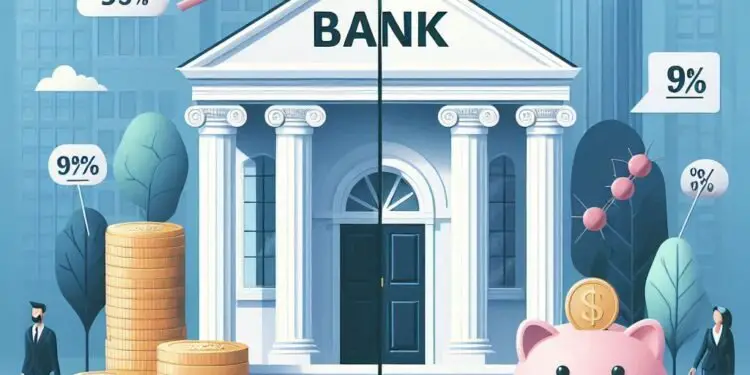Introduction
When it comes to savings and loans, interest rates play a major role in shaping your financial journey Whether you are saving for a brand new car, planning to buy a house, or repaying a scholar loan, one thing performs a first-rate position to your monetary journey: interest prices. Although they may seem like just numbers set by banks or valuable government, interest costs immediately have an effect on how a good deal you earn in your savings or pay in your debts.
In this beginner-friendly manual, we’ll explore how interest quotes paintings, what causes them to rise or fall, and how they effect your every day monetary decisions — from savings accounts to credit cards and home loans.
What Are Interest Rates?
In easy phrases, an interest fee is the price of borrowing cash or the praise for saving it.
- When you borrow, interest is the extra money you pay on top of the loan quantity.
- When you keep, hobby is the amount the bank will pay you for letting them use your money.
Interest fees are commonly expressed as a percent consistent with year, inclusive of 3%, five%, or 7%.
There are two main sorts:
- Fixed Interest Rate: Stays the equal for the mortgage/financial savings time period.
- Variable Interest Rate: Changes relying on market situations.
Who Controls Interest Rates?
Interest quotes are in large part encouraged by way of a country’s crucial financial institution — along with the Federal Reserve inside the United States, the European Central Bank (ECB) in Europe, or the Bank of England inside the UK.
These institutions regulate benchmark hobby fees to:
- Manage inflation
- Control financial increase
- Maintain financial balance
When inflation rises, relevant banks may also growth hobby costs to slow spending. When the economy weakens, they will reduce fees to encourage borrowing and funding.
How Interest Rates Affect Your Savings
Interest costs determine how tons you earn to your deposits in banks or different financial establishments.
🔹 1. High Interest Rates Help Savers
When costs pass up:
- Savings accounts, certificate of deposit (CDs), and fixed-earnings investments grow to be more profitable.
- You earn more passive profits certainly with the aid of keeping cash in the bank.
Example:
If you have $10,000 in a savings account:
- At 1% hobby, you earn $a hundred/year.
- At four% interest, you earn $400/year — 4x extra.
🔹 2. Low Interest Rates Penalize Savers
When hobby fees are low:
- Your financial savings grow slowly, once in a while no longer even retaining up with inflation.
- You may be compelled to discover riskier investments (like shares or crypto) to attain higher returns.
🔹 3. Real Interest Rate vs Nominal Interest Rate
To apprehend the actual advantage of your savings, subtract inflation from the nominal rate.
Real Interest Rate = Nominal Rate – Inflation Rate
Example:
If your financial institution can pay 3% interest however inflation is two%, your actual advantage is just 1%.
How Interest Rates Affect Loans and Debt
While better interest costs advantage savers, they devise challenges for debtors. Let’s discover how:
🔻 1. Higher Interest = More Expensive Loans
When interest charges upward push:
- Monthly bills on credit playing cards, private loans, and mortgages boom.
- New debtors face stricter lending situations.
Example:
A $2 hundred,000 loan at 3% = $843/month
The identical mortgage at 6% = $1,199/month
That’s a distinction of over $350/month.
🔻 2. Lower Interest = Easier Borrowing
When fees are low:
- It will become inexpensive to finance large purchases (houses, motors, training).
- Consumers and organizations are greater inclined to borrow and invest, which stimulates the financial system.
3. Variable-Rate Loans Get Risky
If you have a variable-fee loan, your payments will increase if the primary bank raises hobby rates — even if your profits stays the identical.
Impact on Different Financial Products
🏦 Savings Accounts
- Earn extra whilst fees are high.
- Most conventional banks are sluggish to skip those benefits to purchasers — online banks often offer higher quotes.
🏡 Mortgages
- Fixed-charge mortgages shield you from rising charges.
- Adjustable-rate mortgages (ARMs) may additionally seem cheaper at the start but can spike later.
💳 Credit Cards
- Most have variable prices tied to a benchmark.
- High hobby rates imply better minimal payments and extra interest accrual on unpaid balances.
🎓 Student Loans
- Federal student loans frequently have fixed quotes.
- Private scholar loans may additionally range and may grow to be burdensome for the duration of price hikes.
🚗 Auto Loans
- Typically have shorter terms and glued prices.
- Rate increases still increase the month-to-month value of purchasing a vehicle.
How to Respond to Rising Interest Rates
If you’re navigating an environment with increasing charges, here are strategies to shield yourself:
✅ 1. Pay Off Variable-Rate Debt First
Credit cards and lines of credit score get extra costly. Prioritize paying them off to lessen your burden.
✅ 2. Lock in Fixed-Rate Loans
If you’re making plans a massive buy, relaxed a fixed hobby charge earlier than further will increase.
✅ 3. Reassess Large Purchases
Ask: Can I find the money for this mortgage at higher hobby? Would waiting assist me get higher phrases later?
✅ 4. Shop for Better Savings Rates
Not all banks enhance savings charges equally. Compare banks and keep in mind excessive-yield savings debts.
✅ 5. Diversify Investments
In a high-rate environment, bonds and treasury payments can also provide stable returns with decrease hazard.
How Interest Rates Affect the Broader Economy
Interest rates aren’t simply personal — they affect financial cycles on a national stage.
- High charges: Reduce inflation, slow increase, growth unemployment risk.
- Low fees: Encourage spending and funding, but can fuel inflation or bubbles.
Governments use interest rates to balance inflation and financial balance — it’s a delicate technique that impacts the entirety from task markets to housing prices.
Interest Rates and Inflation: The Connection
Interest prices are the principal financial institution’s main weapon towards inflation. Here’s the way it works:
- When inflation is just too high, prices are raised to make borrowing extra high-priced and reduce spending.
- When inflation is simply too low or the economy slows down, costs are reduce to stimulate demand.
Understanding this dating permit you to time principal financial choices — like refinancing a mortgage or making an investment in a property.
Conclusion
Interest costs may additionally appear to be technical monetary jargon, however they affect your pockets, your future, and your everyday decisions. Whether you are saving, borrowing, or investing, knowledge how hobby quotes work places you in a more potent monetary position.
In instances of growing charges, clever saving and cautious borrowing emerge as more crucial than ever. In times of falling rates, it can be your threat to make investments, refinance, or develop your wealth.
Key Takeaways:
- Interest costs decide how a lot you earn on savings or pay on loans.
- Central banks increase or decrease quotes to control inflation and economic increase.
- High rates advantage savers however hurt borrowers.
- Low prices encourage borrowing however may additionally lessen actual savings fee.
- Planning beforehand facilitates you make better monetary selections in any rate surroundings.













